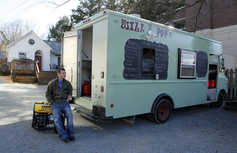NEW REGULATIONS WOULD ALLOW MOBILE VENDORS TO OPERATE IN CHAPEL HILL.
CHAPEL HILL, NC – Food trucks may soon be officially allowed on Chapel Hill streets.
The town is creating rules that would regulate where and how food trucks can operate.
About 20 food truck vendors attended a meeting Monday to ask questions and offer suggestions on the new regulations.
The draft rules the town are partly based on Carrboro’s food truck regulations, said Kendall Brown, a town planner working on the new rules. Carrboro and Durham allow food trucks; Raleigh is deciding how to regulate them.
Chapel Hill began looking into food truck regulations last year after Lex Alexander, owner of 3Cups wine, tea and coffee shop on Elliott Road, asked the Town Council to allow food trucks in the town.
The current draft of the rules would define a food truck as a “readily moveable motorized wheeled vehicle … designed and equipped to serve food.”
The rules would limit food trucks to selling on paved, privately owned parking lots already serving restaurants or bars and having at least 10 designated parking spots.
Trucks would be limited to one per acre, or per 100 parking spaces, with no more than two food trucks on one lot. The trucks would be prohibited from operating while any restaurants served by the parking lot are open.
They would have to be located at least 200 feet from the entrance of an existing restaurant and could not interfere or take up space that would be used for customers of the restaurant or block access roads to the lot.
Some vendors questioned the space restrictions, noting that they would prohibit food truck “rodeos” that have been popular in Durham and elsewhere.
Food trucks that sell in Chapel Hill would be required to pay a prepared food tax to Orange County, but enforcing those laws can be difficult, Brown said.
Making sure taxes from the food trucks in Chapel Hill stay in Orange County is a critical issue, said Mayor Mark Kleinschmidt. He asked town staffers to explore ways to make sure taxes from food truck sales are paid.
“I want to know that they’re actually happening,” he said.
Food trucks offer more opportunities to buy locally, but only if the taxes come back to the local government, said Mayor Pro Tem Jim Ward.
“I personally feel like
Chris Derby is working on opening a food truck in Chapel Hill and says it’s important for the trucks to demonstrate to the brick and mortar restaurants that they’re willing to contribute.
“It is really important to continue to make sure that we understand that the town is open for business and helps entrepreneurs,” he said. “And I really think there’s great opportunity for the beginning of the food truck phenomenon in this area. … It’s a great opportunity for everybody.”
Find the entire article from chapelhillnews.com <here>




